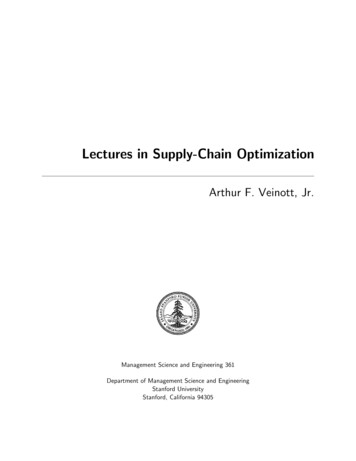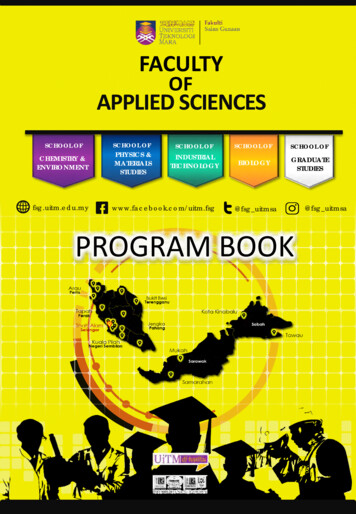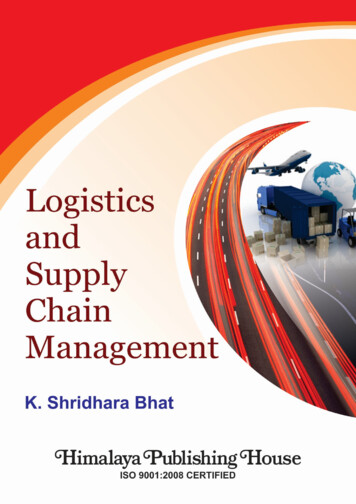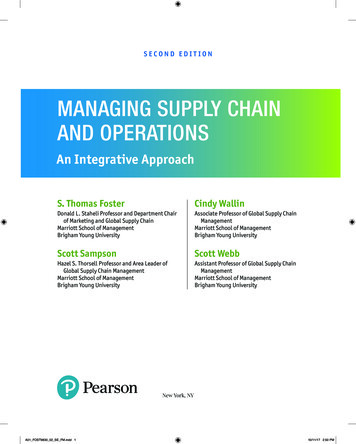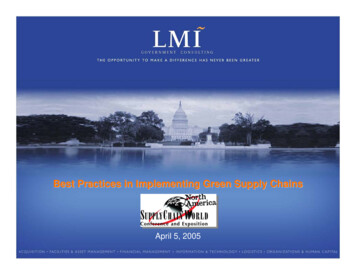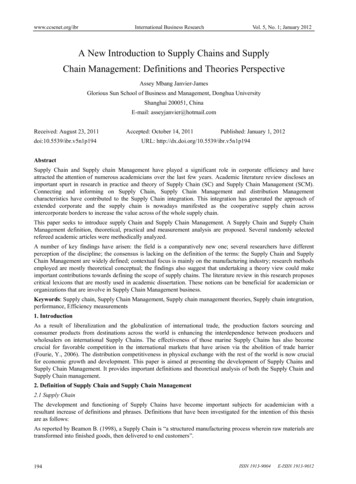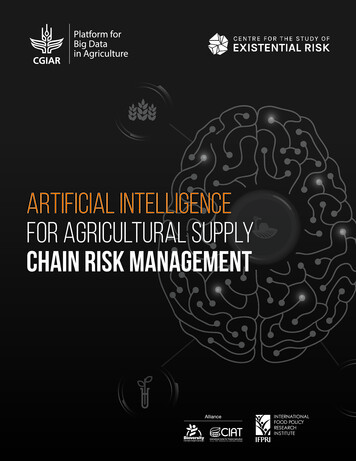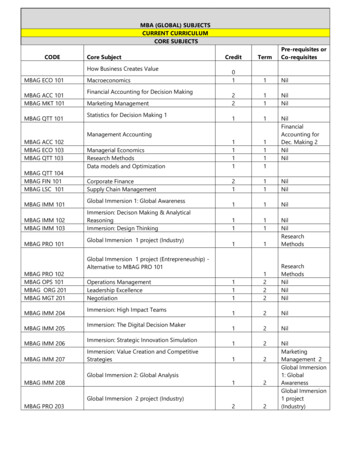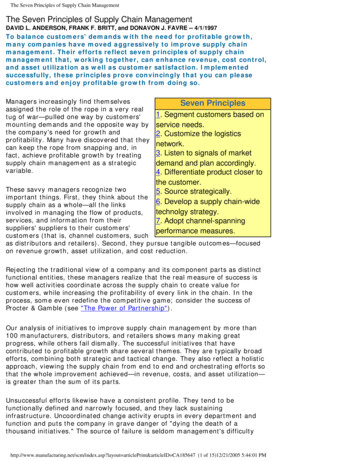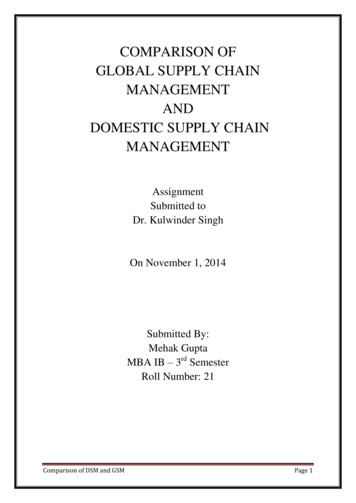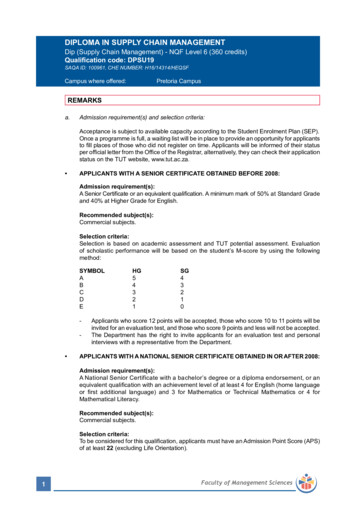
Transcription
DIPLOMA IN SUPPLY CHAIN MANAGEMENTDip (Supply Chain Management) - NQF Level 6 (360 credits)Qualification code: DPSU19SAQA ID: 100961, CHE NUMBER: H16/14314/HEQSFCampus where offered:Pretoria CampusREMARKSa.Admission requirement(s) and selection criteria:Acceptance is subject to available capacity according to the Student Enrolment Plan (SEP).Once a programme is full, a waiting list will be in place to provide an opportunity for applicantsto fill places of those who did not register on time. Applicants will be informed of their statusper official letter from the Office of the Registrar, alternatively, they can check their applicationstatus on the TUT website, www.tut.ac.za. APPLICANTS WITH A SENIOR CERTIFICATE OBTAINED BEFORE 2008:Admission requirement(s):A Senior Certificate or an equivalent qualification. A minimum mark of 50% at Standard Gradeand 40% at Higher Grade for English.Recommended subject(s):Commercial subjects.Selection criteria:Selection is based on academic assessment and TUT potential assessment. Evaluationof scholastic performance will be based on the student’s M-score by using the followingmethod:SYMBOLABCDE-- HG54321SG43210Applicants who score 12 points will be accepted, those who score 10 to 11 points will beinvited for an evaluation test, and those who score 9 points and less will not be accepted.The Department has the right to invite applicants for an evaluation test and personalinterviews with a representative from the Department.APPLICANTS WITH A NATIONAL SENIOR CERTIFICATE OBTAINED IN OR AFTER 2008:Admission requirement(s):A National Senior Certificate with a bachelor’s degree or a diploma endorsement, or anequivalent qualification with an achievement level of at least 4 for English (home languageor first additional language) and 3 for Mathematics or Technical Mathematics or 4 forMathematical Literacy.Recommended subject(s):Commercial subjects.Selection criteria:To be considered for this qualification, applicants must have an Admission Point Score (APS)of at least 22 (excluding Life Orientation).1Faculty of Management Sciences
Assessment procedure(s):Applicants with a final APS of 24 and more will be admitted to the programme. Applicantswith a score of 22 to 23 will be required to do the TUT potential assessment. APPLICANTS WITH A NATIONAL CERTIFICATE (VOCATIONAL) AT NQF LEVEL 4:Admission requirement(s):A National Certificate (Vocational) at NQF Level 4 with a bachelor’s degree or a diplomaendorsement, with at least 50% for English (home language or first additional language),and 40% for Mathematics or 50% for Mathematical Literacy, and 40% for Life Orientation(excluded for APS calculation), and 50% for any other three compulsory vocational subjects.The certificate must be in any of the following fields: accounting, computer science, economics,finance, hospitality, information technology, management, marketing, office administrationor tourism.Selection criteria:To be considered for this qualification, applicants must have an Admission Point Score (APS)of at least 24 (excluding Life Orientation).Assessment procedure(s):Applicants with a final APS of 24 and more will be admitted to the programme. Applicantswith a score of 22 to 23 will be required to do the TUT potential assessment.b.Recognition of Prior Learning (RPL), equivalence and status:See Chapter 30 of Students' Rules and Regulations.c.Intake for the qualification:January only.d.Presentation:Day classes.e.Minimum duration:Three years.f.Exclusion and readmission:See Chapter 2 of Students' Rules and Regulations.CURRICULUMFIRST tical Accounting IBusiness Management ICommunication for AcademicPurposesComputer LiteracyEconomics IA (first-semestermodule)Economics IB (second-semestermodule)Information Literacy I(block module)Life Skills I (block module)Supply Chain Management 105DTOTAL CREDITS FOR THE FIRST YEAR:2PREREQUISITE MODULE(S)120Faculty of Management Sciences
SECOND 06DTEO206DCommercial Law(6)(24)Costing and Estimating(6)(24)Procurement Management II(6)(24)Supply Chain Management II(6)(24)Transport Economics II(6)(24)PREREQUISITE MODULE(S)Supply Chain Management ISupply Chain Management IEconomics IAEconomics IB120TOTAL CREDITS FOR THE SECOND YEAR:THIRD YEARCODEMODULEBSM306DBusiness Management III(6)(24)Procurement Management III(6)(24)Quantitative Techniques(5)(24)Supply Chain Management III(6)(24)Supply Chain Operations AL CREDITS FOR THE THIRD YEAR:120TOTAL CREDITS FOR THE QUALIFICATION:360PREREQUISITE MODULE(S)Business Management ISupply Chain Management IIProcurement Management IISupply Chain Management IIMODULE INFORMATION (OVERVIEW OF SYLLABUS)The syllabus content is subject to change to accommodate industry changes. Please note that a more detailedsyllabus is available at the Department or in the study guide that is applicable to a particular module. At timeof publication, the syllabus content was defined as follows:BBUSINESS MANAGEMENT I (BSM105D)1 X 3-HOUR PAPER(Module custodian: Department of Management and Entrepreneurship)A focus on the different management functions of business organisations in the South African environment. Itdescribes how managers should manage resources and activities in such a way that organisations can operateas profitably as possible. (Total notional time: 240 hours)BUSINESS MANAGEMENT III (BSM306D)1 X 3-HOUR PAPER(Module custodian: Department of Management and Entrepreneurship)Students acquire skills to apply management functions, develop a broad understanding of business and management concepts. It relates to theoretical models that can be applied in a workplace such as change management, strategy and diversity management. The marketing management component provides students withadvanced knowledge in areas such as applied principles in marketing and research, product development,design of the marketing plan, environmental analysis, creativity and innovation. (Total notional time: 240 hours)CCOMMERCIAL LAW (CLW206D)1 X 3-HOUR PAPER(Module custodian: Department of Law)Introduction to South African legal system. General principles of law of contracts. Specific contracts: Contract ofsale, lease agreement, insurance contracts, employment contract, specific commercial transactions, e.g. law ofagency, surety, National Credit Act, 2005 (Act No. 34 of 2005) and Consumer Protection Act, 2008 (Act No. 68of 2008). (Total notional time: 240 hours)3Faculty of Management Sciences
COMMUNICATION FOR ACADEMIC PURPOSES (CAP105X)1 X 3-HOUR PAPER(Module custodian: Department of Applied Languages)A workable knowledge of English is an essential skill for any graduate who is required to conduct themselvessuccessfully in a professional working environment. This module will equip students with the competenciesrequired to compose a selection of written texts related to communicating both internally and externally withina professional environment. In addition, the module includes strategies that are essential for the effective communication in various situations, including small groups to avoid unproductive conflict, a multicultural context,etc. (Total notional time: 240 hours)COMPUTER LITERACY (CPL105X)CONTINUOUS ASSESSMENT(Module custodian: End User Computing Unit)Provides foundational knowledge in computing fundamentals, essential digital skills in key applications basedon MS Office Suite and network basics (i.e. MS Outlook and Internet). Online exams are mapped with End-UserComputing: SAQA 49077 (61591) Core Element as well as Internet and Computing Core Certification (IC3).(Total notional time: 100 hours)COSTING AND ESTIMATING (CSE206D)1 X 3-HOUR PAPER(Module custodian: Department of Finance and Investment)The basic methods and some selected techniques of cost accounting for application in the business environment. Cost elements, material costs, labour costs and overheads, job costing and manufacturing statements.The basic methods to calculate the profitability of a manufacturing concern, depreciation of assets, processcosting, standard costing, cost-volume-profit analysis and budgets. (Total notional time: 240 hours)EECONOMICS IA (ECA115D)1 X 3-HOUR PAPER(Module custodian: Department of Economics)Insight into the principles and applications of microeconomics. The core content for this moduleincludes the problem of scarcity, choice, elasticity, utility and demand, efficiency and equity, production andcosts, price determination under different market structures: perfect competition, imperfect competition as wellas monopoly. Basic calculus and algebra are introduced. (Total notional time: 120 hours)ECONOMICS IB (ECB115D)1 X 3-HOUR PAPER(Module custodian: Department of Economics)Insight into the principles and applications of macroeconomics. The core content for this module includesmeasuring macroeconomic performance, simple Keynesian model, money and banking, fiscal and monetarypolicy, exchange rates and the balance of payments and introduction to international trade. (Total notionaltime: 120 hours)IINFORMATION LITERACY I (INI125D)CONTINUOUS ASSESSMENT(Module custodian: Directorate of Library and Information Services)Introduction of information literacy. Development of a search strategy and application of a search string to searchengines and academic databases. Evaluation of information sources. Ethical and legal use of information. (Totalnotional time: 20 hours)LLIFE SKILLS I (LFI125X)CONTINUOUS ASSESSMENT(Module custodian: Directorate of Student Development and Support)Personal, socio-emotional and academic skills development for students in higher education. This moduleincludes 1. Intra- and interpersonal skills (e.g. emotional intelligence, relationships, and conflict management);2. General study skills (e.g. time management, goal setting, learning styles); 3. Health and wellness (e.g. HIV/AIDS, GBV issues, substance abuse); 4. Student life and adjustment (e.g. identity development, adjusting to ahigher education environment); and 5. Financial management. (Total notional time: 20 hours)4Faculty of Management Sciences
PPRACTICAL ACCOUNTING I (ACP105D)1 X 3-HOUR PAPER(Module custodian: Department of Accounting)Introduction to accounting, the accounting equation, books of prime entry, bank reconciliation statements,debtors and creditors control accounts. Adjustments, financial statements (sole trader), inventory (differentsystems and valuation), budgets and budgetary control, non-current assets and their disclosure, manufacturingac-counts, cost-volume-profit analysis, different forms of enterprise, their financial statements and relatedmatters, basic cost accounting and cost behaviour. (Total notional time: 240 hours)PROCUREMENT MANAGEMENT II (PRC206D)1 X 3-HOUR PAPER(Module custodian: Department of Marketing, Supply Chain and Sport Management)Relationship spectrum, sourcing, ethical and social responsibilities, risk management, management ofquality (TQM). Material budget, cross-functional teams, services procurement, specifications, business needsand global sourcing. (Total notional time: 240 hours)PROCUREMENT MANAGEMENT III (PRC306D)1 X 3-HOUR PAPER(Module custodian: Department of Marketing, Supply Chain and Sport Management)Advance procurement techniques, appraisal of suppliers, negotiation techniques, procurement research andvalue analysis. Electronic procurement, contract management, sustainability, total cost of ownership, capital andoperational procurement, outsourcing, public sector procurement. (Total notional time: 240 hours)QQUANTITATIVE TECHNIQUES (QTS105D)1 X 3-HOUR PAPER(Module custodian: Department of Mathematics and Statistics)Introduction to statistics and sampling methods, organisation and description of data using tables and graphs,measures of location and dispersion, basic probability, probability distributions (binomial, poisson, normal),Introduction to sampling distributions (means and proportions), confidence intervals, hypothesis testing, Chisquared tests, regression and correlation analysis, time series analysis, index numbers, elementary interestcalculations. (Total notional time: 240 hours)SSUPPLY CHAIN MANAGEMENT I (SCM105D)1 X 3-HOUR PAPER(Module custodian: Department of Marketing, Supply Chain and Sport Management)An introduction to supply chain management, Supply chain management activities; procurement and logistics; inventory management: warehousing, materials handling, physical distributions, transportation, customerservice, packaging, global supply chain management, public sector supply chain management. Inbound andoutbound supply chain management. Demand forecasting, ICT in supply chain management. (Total notionaltime: 240 hours)SUPPLY CHAIN MANAGEMENT II (SCM206D)1 X 3-HOUR PAPER(Module custodian: Department of Marketing, Supply Chain and Sport Management)Practical application of economic order quantity, financial aspects of logistics and supply chain management,forecasting supply chain requirements, design of storage and handling, equipment used in facilities, international transport, product returns and reverse logistics management. (Total notional time: 240 hours)SUPPLY CHAIN MANAGEMENT III (SCM306D)1 X 3-HOUR PAPER(Module custodian: Department of Marketing, Supply Chain and Sport Management)Practical application of the different logistics functions, contemporary logistics research, contemporary logisticsissues, their influence on society and business environment. (Total notional time: 240 hours)SUPPLY CHAIN OPERATIONS I (SCO305D)1 X 3-HOUR PAPER(Module custodian: Department of Marketing, Supply Chain and Sport Management)Introduction to production management. Operational strategies that use quality, cost and services as competitive weapons in designing and developing products and production processes. Long-range capacity planningand facility layout. Introduction to quality management. (Total notional time: 240 hours)5Faculty of Management Sciences
TTRANSPORT ECONOMICS II (TEO206D)1 X 3-HOUR PAPER(Module custodian: Department of Marketing, Supply Chain and Sport Management)Transport regulatory environment; challenges of urban goods transport; provide a perspective on the future oftransport; understand the importance of transport infrastructure; terminals and hubs in transport; analyse fixed,variable and overhead transport costs; compare and contrast modes of transport; transport planning and fleetmanagement. (Total notional time: 240 hours)6Faculty of Management Sciences
An introduction to supply chain management, Supply chain management activities; procurement and logis-tics; inventory management: warehousing, materials handling, physical distributions, transportation, customer service, packaging, global supply chain management, public sector supply chain management. Inbound and outbound supply chain management.
